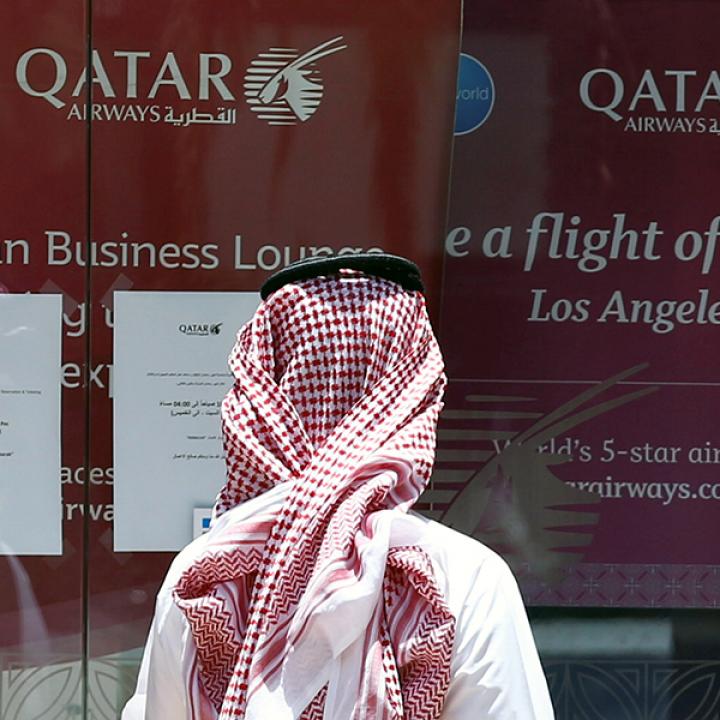
- Policy Analysis
- Fikra Forum
The Western Media Misguided Narrative about Al Jazeera

On June 5, 2017, yet another dangerous crisis broke out in the Middle East: The Arab Quartet, whose members are Saudi Arabia, the United Arab Emirates, Bahrain, and Egypt, decided to cut diplomatic ties with neighboring state Qatar. The response of American and Western media to the affair has been perplexing, not to say misguided: Erroneously referring to the boycott as a “siege,” American and Western news outlets seem to adopt Qatar’s stance, according to which the Quartet’s demand to shut down the state-owned channel Al Jazeera constitutes an attempt to suppress free speech. Such representation of the conflict is alarming not only because Qatar’s accusations and talk of infringements are hypocritical, but also because the coverage itself bolsters Doha’s divide and conquer strategy and fails to identify some of the important factors behind the crisis, like Qatari-sponsored propaganda.
To argue, as Doha seems to do, that the dispute over Al Jazeera revolves around the right to free speech, is not only wrong but also highly ironic. Far from being a champion of free speech, Al Jazeera, a mouthpiece for the Qatari monarchy, is a purveyor of Islamist extremism, jihadism, and Salafism: Among other things, the channel has aired an interview with the leader of Jabahtu Alnusra, an al-Qaeda offshoot. Moreover, at one point, a guest on the popular show The Opposite Direction, a copy of the American Crossfire, has pledged his allegiance to IS leader, Abu Bakr al-Baghdadi. Not surprisingly, during the events of the Arab Spring, Al Jazeera did not side with the revolutionaries, but rather with the Islamists.
In general, Qatar is hardly in a position to lecture on democracy and human rights: Not long ago, Qatari authorities have sentenced a Qatari poet for fifteen years in prison for reciting a poem criticizing the former Emir Hamad al-Thani. It is also worth mentioning that this former Emir, who is the father of the current ruler Tamim, actually rose to power after dethroning his own father in a palace coup. Like father like son, Hamad followed in the footsteps of his father, Khalifa, who himself usurped the throne from his cousin, Ahmad.
For these reasons, it would be wrong to speak of Al Jazeera, the Crown Jewel of Qatar’s media empire, as a voice for the voiceless and a platform for promoting democracy, rule of law, diversity, and tolerance. As a matter of fact, Doha uses Al Jazeera to enact the zigzag policy at the heart of the current crisis. This tactic is far from new: During the U.S.-led war on Iraq, for example, the network was the most vociferous critic of the United States and the war efforts, never mentioning the fact that American warplanes were launching their sorties in Iraq from a military base located in Qatar. Moreover, while adopting a lamenting tone in its reporting of the war’s casualties and victims, Al Jazeera also provided former Iraqi President Saddam Hussein with a sympathetic media platform, failing to mention the late dictator’s abysmal record of terror. Viewers would have had to have been forgiven if they couldn’t figure out whose side Al Jazeera was on.
Qatar then is simply an oil-rich autocracy, which – despite its small size – is nonetheless desperate to carve out a place for itself in the regional and international arena. To this end, it does not only welcome the presence of foreign military bases, but also acts in a deceptive manner towards its neighbors: Indeed, Qatar is in the habit of backstabbing fellow Arab countries, supporting insurgent groups attempting to topple their governments, and using petrodollars to meddle in their affairs. Thus, it is preposterous for Qatar to claim that the boycott amounts to an attack on its sovereignty: While speaking of sovereignty, Qatar funds, arms, promotes and embraces Islamist militias and organizations in Libya, Tunisia, Yemen, Syria, Iraq, and most of all in Egypt.
Nonetheless, although Qatar’s well-known, well-documented support of extremism in different shapes and forms has contributed to the formation of the current crisis, other factors, which were overlooked by Western media, have also played an important role in the affair: For a long time, Qatar has been sowing the seeds of dissent, discord, and division among fellow members of the Gulf Cooperation Council (GCC), which includes the United Arab Emirates, Saudi Arabia, Bahrain, and Kuwait. The only GCC member that is not a party to the conflict, Kuwait has volunteered to act as mediator between the Arab Quartet and Qatar Ironically enough though, according to one prominent Kuwaiti media official, Kuwait has actually been on the receiving end of Qatar’s propaganda war, spearheaded by Al Jazeera, for over twelve years. Of course, Kuwait is far from being the only nation in Qatar’s sights. Another nation often in the crosshairs of Al Jazeera in Egypt, a frequent target of criticism. According to (questionable) reports by the network, President el-Sisi’s regime is constantly on the verge of collapse and Egyptian society is plagued by misfortune (in this context, it is worth noting that Qatar is an ally of the Muslim Brotherhood, an organization accused by the Egyptian authorities of being complicit in a vicious all-out war of terror against Egypt’s military, police and people).
It seems, then, that Qatar has adopted Iran’s foreign policy strategy, which is guided by the notion that it is easier to stay strong when your neighbors are weak and divided. Unfortunately, when it comes to Qatar, the United States, along with other Western nations, tends to talk the talk without walking the walk. While the West does urge Doha to stop supporting and funding terrorism, Qatar is nonetheless able to stay out of trouble by investing in Western markets and agreeing to host foreign military bases. But, as Qatar continues to pump money into American think tanks and lobbying organizations, Al Jazeera moves forward with its divisive agenda.


